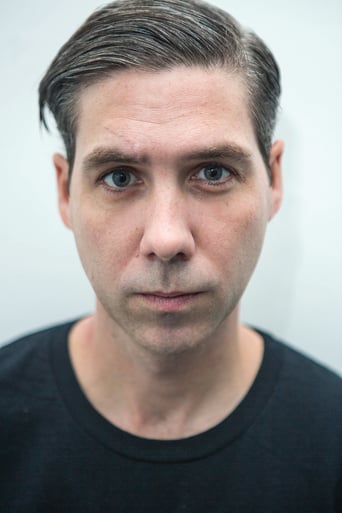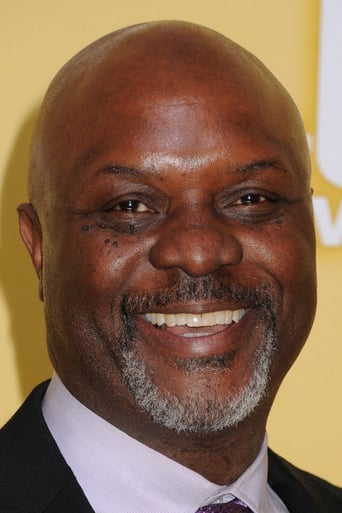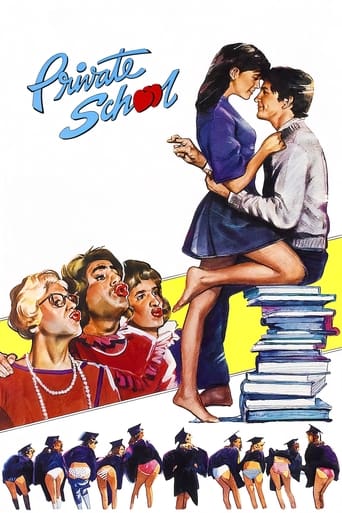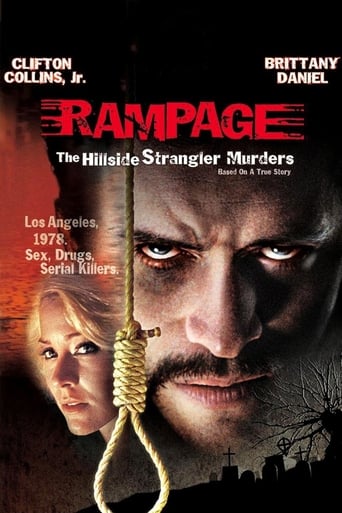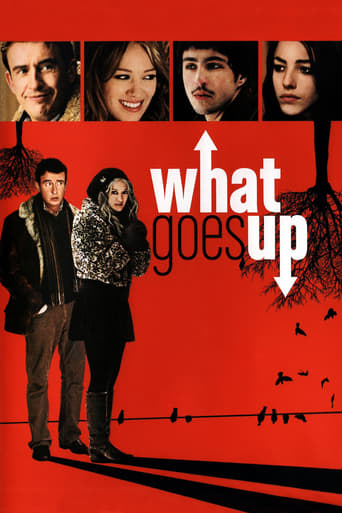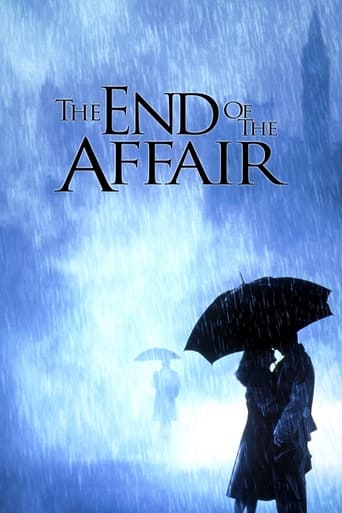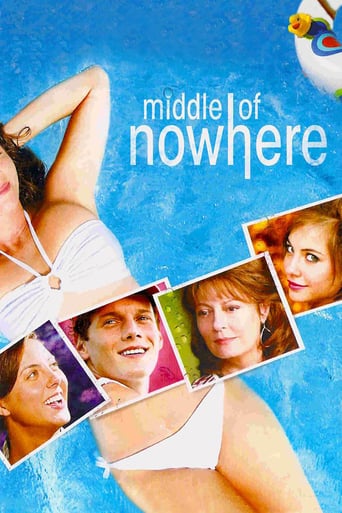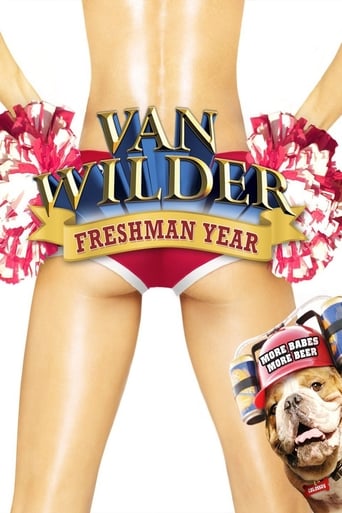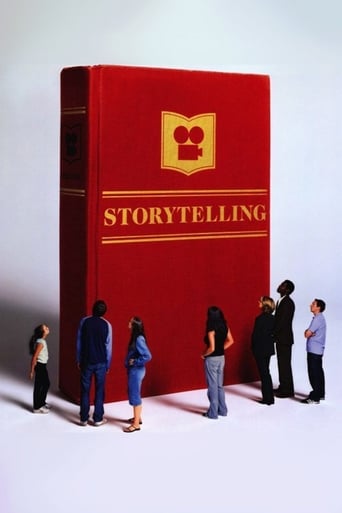
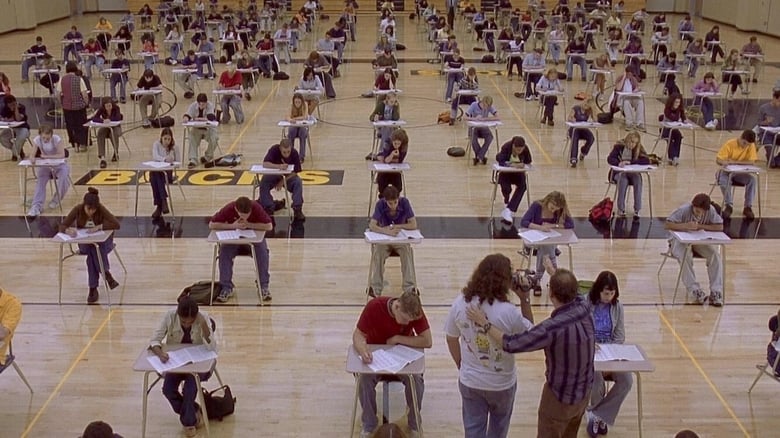
Storytelling (2001)
College and high school serve as the backdrop for two stories about dysfunction and personal turmoil.
Watch Trailer
Cast
Similar titles
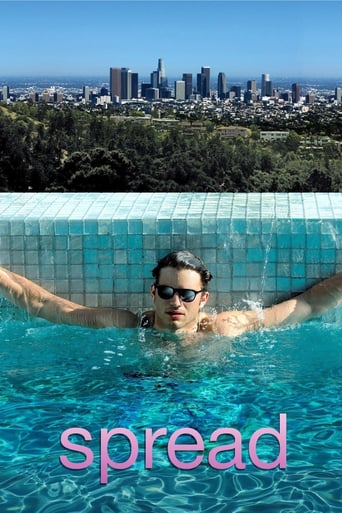
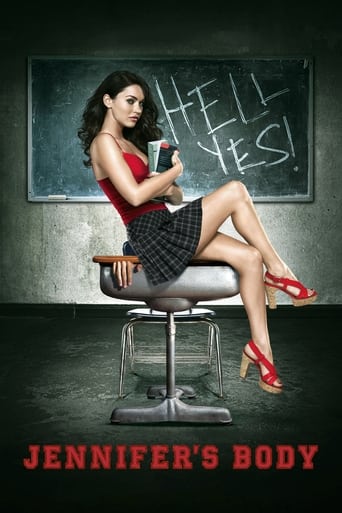
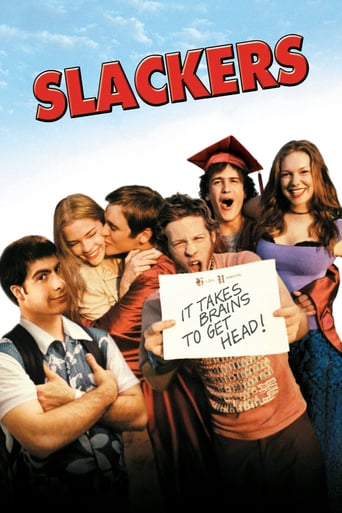
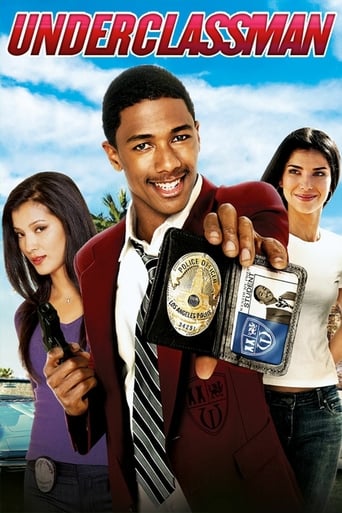
Reviews
I like the storyline of this show,it attract me so much
Just perfect...
Great Film overall
It's fun, it's light, [but] it has a hard time when its tries to get heavy.
Todd Solondz's Storytelling could be looked at as a film about film (the second part),and a film about fiction in general both parts). The first part named precisely Fiction tells the misadventures of a young couple studying creative writing at the University. Marcus, a brain damaged, and Vi, his girl friend, seem to be dragged by their sexual drives when composing their texts.He will read in the writing class a story about an invalid proud of his handicap (a sweetend narrative about his own situation). The text being reported will be deadly criticized by their implacable teacher, a black who was winner of a Prize Pulitzer. Vi's eventual sadomasochist affair with the same teacher gives her material for her next writing exercise, which would also suffer appalling remarks.She is convinced it is a good story, merely because based on true facts. The judgments by the writing pals hardly hide their own superficiality and clichés. The teacher, on his side, exploits his evaluating skills to refer indirectly to his own depraved relation with her. Creating fiction serves to settle one's account with somebody. What characters say and do, lacks, more often than not, correspondence with what they think, and in many cases they are unable to grasp the absurdities of their statements. In the second part, named Non-Fiction, Fern Livingston, the mother in the Jewish middle-class family, argues and believes that she and her off-springs are virtual victims of the Holocaust, notwithstanding her parents had emigrated from Europe before it. Scooby the supposed rebel in the family, who repels going to study at the University, dreams about becoming a television talk- show celebrity and is steady convinced of his talents: "I'm not an idiot man, I watch TV" (Could it be that most of the spectators wouldn't easily endorse this assertion). Cynical dialog reaches high tops in the scene, wherein Mickey, the infatuated youngest son in the family, asks the housemaid what it's the meaning of rape. She answers: "It is when you love someone and they don't love you and you do something about it". Solondz draws a ferocious caricature of American people, blacks, whites, rich, poor, adults and children, who are puppets of their ignorance, prejudices and wickedness, and live their fantasies as indisputable facts. Also the amateur director in the story, who decides to shoot a documentary movie about Scooby experiences at the High School, and considers himself to be an objective witness of reality, seems not to be aware of his unscrupulousness. When the boy uncovers his hypocrisy: "You are a pervert", Toby, the director, denies it, without pondering the dangerous implications of his reply: "No. Actually, I am a documentary filmmaker". The spectators could willingly fall prey of this Solondz's juicy, sardonic, grotesque tragedy in two episodes, like flies trapped in an attractive but sticky mass. The hypnotic musical theme accompanying the initial credits paves the way to. Adam Gai
What makes Storytelling stand apart from other Solondz works is that it is a more explicit commentary on film-making, documenting, any kind of storytelling. With this film, we get a meta-presentation of the craft (Mulholland Drive comes to mind here).In the "fiction" portion, we have a student writing about a personal experience in a college writing class. The experience is explicitly shocking in its racial and sexual questioning, but even the 'shockingness' of it is questioned by Solondz. Unsurprisingly, Solondz beats us to the punch, already mapping our responses. The writing class responds to the story much like many of the reviewers here, using language like "self-indulgent" and "shock with no substance". Solondz then brings up the question, "how can this be if it really happened?" What Solondz is depicting the grimy underbelly of suburbia, true in character, only appearing absurd and contrived when high in density. But once again, Solondz jabs us with the theory that "once you begin writing it all becomes fiction." Within this first short section of this movie, Solondz has set everything up for us: an impenetrable, self-referential mobius strip of a movie.In the second portion of the film, we are told the story of the documentary. Despite the family being documented in a "non-fictional" way, we get caricatures of their beings. The director generally does 'care' about his subjects but like the typical Solondzian ending "don't be sorry, your movie's a hit", we see the struggle of a filmmaker seeking to please his audience as well as 'staying true' to the art.What is ironic here is that Solondz' characters aren't really "mean-spirited" and "banal" people. It is more likely that these adjectives can be applied to the audience who doesn't see 'the truth', who overlooks the diluting processes of documentation; the writing class, the test-audience, you and me. Self-referential paradigms are often over-deterministic and thus seemingly unnecessary, but Solondz has a more lighthearted manner to his display. He isn't really misanthropic; he understands the value, the necessity of discussion, enough to create characters and movies of an accessible complexity. He may be a bit bitter, shrugging his shoulders and saying "don't listen to me, what I know?", but what he really means is "C'est la vie, so what are you going to do about it?"
STORYTELLING is by the director of WELCOME TO THE DOLLHOUSE and HAPPINESS and, surprisingly, is his most disturbing film. It is a film that really tries to undermine all the ugliness of the human race with incredibly heartless cruelty. WELCOME TO THE DOLLHOUSE was the film in which a little girl suffers ridicule at the hands of her classmates and family in hostile, over-the-top ways. HAPPINESS was the film in which a man rapes women over the phone while another abuses his son's friends. Both of those films were directed and written in smart, clever, ironic, and challenging ways that made sense and were better films. STORYTELLING, however, seems to try to be as impossible to watch as possible. Want proof? The opening scene involves a boy with cerebral palsy reading a story he wrote to his creative writing class before being ridiculed by his teacher and classmates about what a horrible piece of writing it is. The film, from a distance, is about two stories called FICTION and NON-FICTION. FICTION is about a girl in a creative writing class who is assaulted by her teacher. NON-FICTION is about a dysfunctional family being filmed by a documentary filmmaker. At a much closer look however, the film is just about awkward moments that everybody has only in this film they go horribly bad in every possible way. It's incredibly irritating and sickening to watch. The characters are mostly sketchy and ugly, with the main exception being the character of Scooby in the second story. His character doesn't pretend to be happy and perfect. He isn't a jerk to everybody and doesn't constantly whine. He lies a lot, mainly to himself, but doesn't harm anybody. The film covers all sorts of issues including the mentally disabled, rape, ridicule, race, homosexuality, the holocaust, and immigration. I didn't like any of the characters, nor was I supposed to. Instead I felt sorry for everybody and kind of just wanted to to all die. However, it isn't that easy in this film. Everybody is just so insanely miserable that it eventually works it's way into your psyche. I find this film to be a much more challenging film than Todd Solondz's previous outings. It's probably his least accessible and his worst. I find the film to be an incredibly daring work that certainly is worth checking out. However, the film's efforts to shock and disturb manage to overwhelm the positive aspects of it. I love the film, but I don't feel at all comfortable recommending it.Pros: -Generally a very solid film in acting, directing, set design, etc... It's all very top-notch Cons: -the film is filled with outright heartless cruelty.
On movies like Happiness or Welcome to the dollhouse,Todd Solondz showed he has a lot of talent.He could mix,greatly,strong subjects with a lot of sarcasm.On Storytelling,Solondz's mistake was that he could not mix well strong subjects with sarcasm;he put excessive sarcasm and the movie looks like a mediocre comedy than a serious but sarcastic drama like Solondz's previous films.The films' two stories have a weak plot.The film has excellent actors such as John Goodman or Paul Giamatti but they cannot adapt to strange style this movie has.Storytelling is Solondz's weakest movie.If you wanna see a great film directed by Solondz,you need to watch Fear,anxiety and depression,Welcome to the dollhouse,Happiness or Palindromes(his last movie by now).

